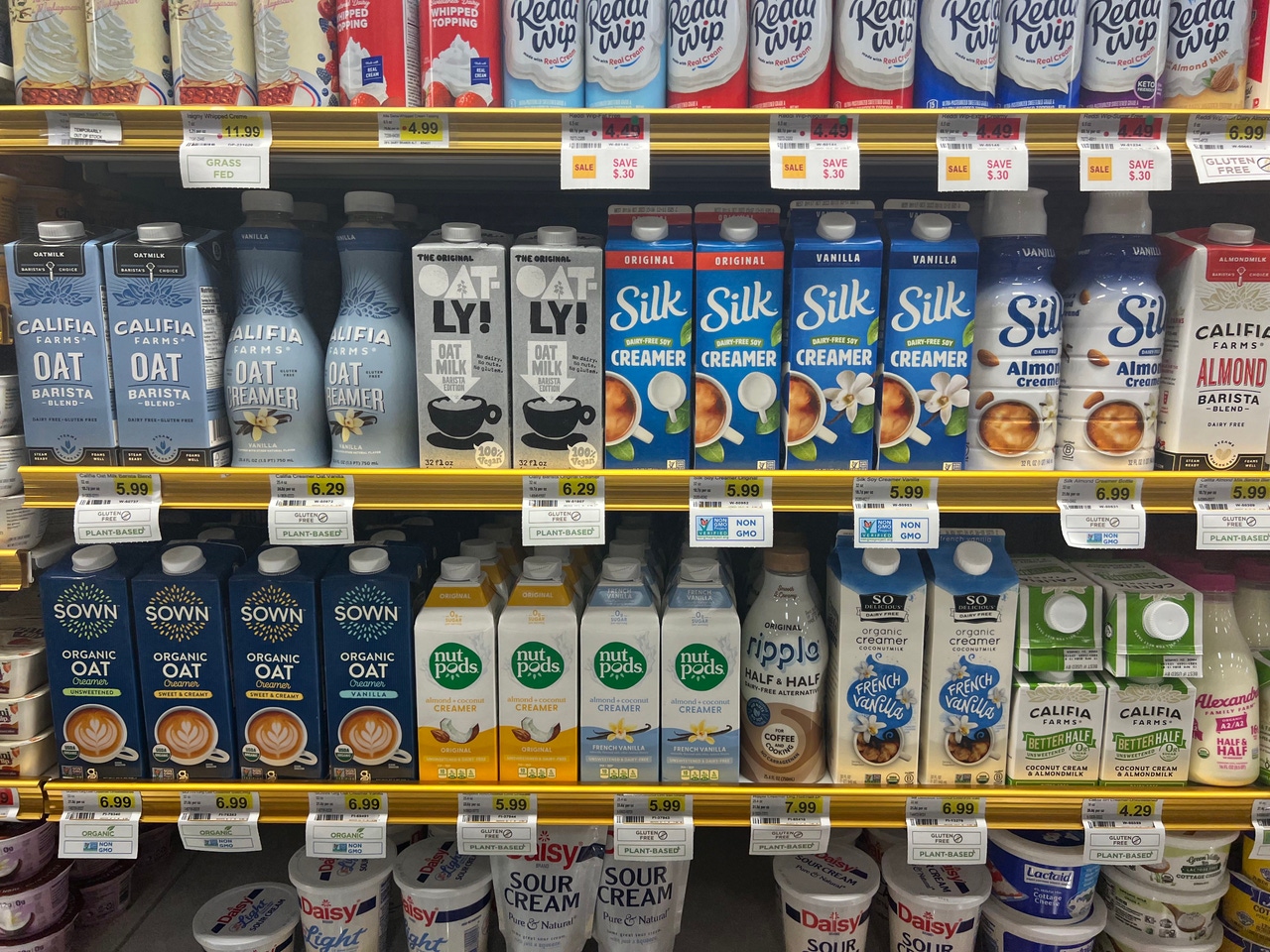Plant-based milk sales are hotPlant-based milk sales are hot
But plant-based dairy overall is seeing declines
October 20, 2023

Plant-based dairy items were the belle of the ball in the refrigerated section a few years ago, but the trend has slowed down for most of the segments, though they are still posting respectable sales.
Rich Gilmore, vice president of center store for Southern California grocer Gelson’s, said that plant-based dairy beverages and creamers are beginning to evolve outside the standard “varietals,” as companies test concepts like flax, pistachio, walnut, barley, and sesame.
“The almond and oat segments are saturated, everyone is looking for something to differentiate themselves from the masses,” he said. “Plant-based yogurts and cheeses have stumbled a bit over the past year. Innovation has certainly slowed down and many of the existing brands are struggling to maintain their foothold in these competitive categories.”
He noted that the quality of these products has substantially improved over the past five years and consumers have also made them part of their weekly shopping list.
At Gelson’s, overall plant-based dairy sales have dropped over the past two years since they peaked during 2020.
“Beverages and creamers remain solid with almond and oat milk performing the best,” Gilmore said. “Soy milk continues its slow decline, but some growth is being seen in the lower volume, more niche varieties, and flavors like barley and seed milks.”
The one area where Gelson’s has continued to see growth is plant-based milk — a trend consistent throughout the U.S.
According to the Plant Based Foods Association, plant-based milk represented the largest segment in the plant-based foods industry, with 40.6% of U.S. households purchasing plant-based milks in 2023, including a repeat purchase rate of 75.7%.
Still, it’s not good news for other categories. The International Dairy Deli Bakery Association has reported a decrease in plant-based purchases throughout the retail environment.
“Clean ingredients are a priority over plant-based,” said Heather Prach, vice president of education for the IDDBA. “We are also seeing more people accepting items without meat as a selection, but not fully committing to a plant-based diet. People continue to subscribe to a flexitarian lifestyle.”
However, IDDBA continues to see stable numbers in the plant-based milk alternatives, revealing that many of the traditional milk doors have been replaced with non-dairy milk alternatives, and more stores are offering full refrigerator doors of plant-based items.
“Overall, I still think plant-based is driven by health and wellness as a focus,” Prach said.
One dairy category that hasn’t seen good numbers recently is plant-based cheese, with all alternative cheeses down 12.3% in July compared to the same time last year, and the segment overall down around 7% over the last 52 weeks.
At Natural Grocers, a Lakewood, Colo.-based operator, alternative milk and yogurt are its best performers over the past year.
Missy Davis-Hood, the supermarket’s category manager for frozen and refrigerated, said that oat milk has been the store’s top plant-based item and it’s also utilized in creamers, yogurt, and milks.
“Customers are drawn to these products because they are not only looking for a healthier alternative to dairy products, but also from an environmental standpoint of lowering carbon emissions,” she said.
Kyle Kirkpatrick, director of center store for The Giant Company, the Carlisle, Pa.-based operator of Ahold Delhaize USA’s Giant/Martin’s supermarkets, has also viewed oats as the fastest-growing segment in the dairy department.
“There has been innovation in offering blends from various different plant-based sources, like combining almond and pea protein together, but those items haven’t really resonated with our customers,” he said. “Plant-based coffee creamers are showing the biggest growth for us [in areas] where we are seeing some stagnation in yogurt and non-dairy milk. Customers are also looking for value, so we have seen growth in our private brand products.”
As more customers look for healthier, more sustainable, and animal-friendly products, plant-based dairy products should continue to make an impact on the overall dairy segment, according to Kirkpatrick, even if they are not as popular as a year or two ago.
“These products also deliver on taste which is critical to their success as well,” he said.
The right balance
The rapid growth in the segment between 2018 and 2020 led to many retailers overstepping their spacing via the segmenting out of high-visibility spaces in the store to highlight expanding selections.
“As sales have declined over the past two years, we have had to make adjustments to reign in that over-allocation of space,” Gilmore said. “Utilizing current data along with knowledge of trends will allow a retailer to balance space, showing that we are in front of trends without negatively impacting other, higher volume, segments.”
With an influx of alternative dairy items available to retailers, finding the proper balance of shelf space is something that takes a lot of thought.
Davis-Hood said that Natural Grocers’ strategy comes from listening to customers and examining store data.
“We look at what our leading sales drivers are and add similar items to our current schematics,” she said. “We also consult with our Nutritional Education Department to collectively identify food and drink trends on a regular basis.”
Kirkpatrick added that the puzzle for creating an ideal plant-based section at store level comes down to a mix between sales, growth trends, and shrink.
“We block plant-based within each planogram to create a destination within each category,” he said. “This strategy has worked well for us and makes it easier for the plant-based consumer to find what they are looking for.”
Savvy plant-based marketing
Other than plant-based milk, many plant-based foods are hard to find in stores, according to the Plant Based Food Association, which is why retailers need to highlight their other plant-based items with a strong marketing message.
At Natural Grocers, plant-based dairy items are regularly included and showcased within its promotions to match its annual marketing calendar. This includes recipes, Health Hotline articles, on-site Nutritional Health Coaching classes and special {N}power discounts.
At Giant/Martin’s supermarkets, plant-based over indexes with its ecommerce consumers, so the company relies on its website to engage and market to them.
“We also regularly feature plant-based items in our circular to not only show the variety of products and brands we carry, but to also offer value in these more challenging economic times,” Kirkpatrick said.
About the Author
You May Also Like





.webp?width=300&auto=webp&quality=80&disable=upscale)
